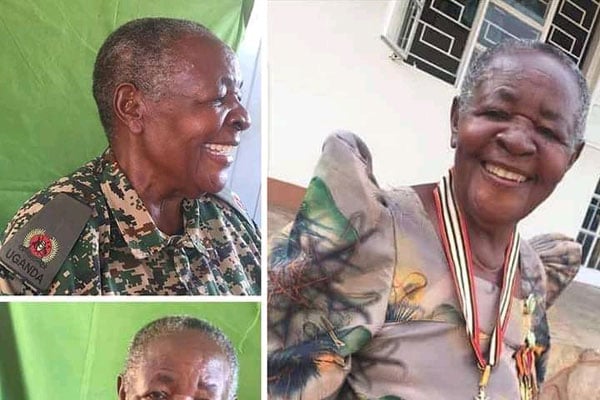NRA historical who was once accused of poisoning Museveni dies

Uganda People’s Defence Forces (UPDF) is mourning one of the National Resistance Army (NRA) historicals, Maj Oliver Zizinga who died January 23, 2021 in Kampala. PHOTOS/ COURTESY.
What you need to know:
- Another time, with Njuba, Zizinga was accused of poisoning Museveni. Such was her pain at the accusation that she cried for three days and attempted to put herself in the line of fire so that she could be killed.
- An anecdote is that she was charged with the offense of crying by the High Command. The crime was punishable with death, but Museveni pleaded mercy for her.
- After the war, Zizinga served in the Fifth Parliament (the NRC). She has been serving as a presidential advisor.
Uganda People’s Defence Forces (UPDF) is mourning one of the National Resistance Army (NRA) historicals, Maj Oliver Zizinga, who died today in Kampala.
UPDF spokesperson, Brig Gen Flavia Byekwaso said Maj Zizinga died Saturday at Medipal Hospital Kololo in Kampala.
“The UPDF family commiserates with the family of our NRA historical Maj Oliver Zizinga who passed on today at 10:00am at Medipal Hospital Kololo. Your struggle to liberate Uganda was not in vain. May the Lord rest her soul in perfect peace,” Brig Gen Byekwaso tweeted Saturday.
Maj Zizinga is one the better known women whose contribution helped bring the current government into power.
She’s one of the women who were actively deployed in battles against the Uganda National Liberation Army (UNLA) between 1981 and 1986.
Three of Zizinga’s children were killed in 1980 by UNLA soldiers. That incident made her vow to support anyone who would fight them. She joined the NRA as a mobiliser doing clandestine work.
By late 1981, Zizinga in one of the interviews with this publication revealed that she was one of the three women on the National Resistance Council (NRC). She and Gertrude Njuba were in charge of Mr Yoweri Museveni’s welfare and never participated in any battle. They ate one finger of matooke and a piece of meat per day.
Zizinga survived the firing squad thrice. The first time was when a leaf of mujaaja (basil) appeared in Museveni’s cup. His auntie had warned him that he could be bewitched through mujaaja. When he fell sick after drinking the tea – saying there was something walking along his spine, Dr Bata diagnosed Amoebiasis. Zizinga and Njuba stayed awake to make sure he took his medication.
Another time, with Njuba, Zizinga was accused of poisoning Museveni. Such was her pain at the accusation that she cried for three days and attempted to put herself in the line of fire so that she could be killed.
An anecdote is that she was charged with the offense of crying by the High Command. The crime was punishable with death, but Museveni pleaded mercy for her.
After the war, Zizinga served in the Fifth Parliament (the NRC). She has been serving as a presidential advisor.
This is Zizinga's narration to Daily Monitor in 2014
I was born a natural fighter never believing in oppression. During the Milton Obote II regime, three of my children were killed by government soldiers, and I promised to support any person who came out to fight Obote. When Museveni promised to go to the bush if the elections were rigged, I was more than ready to join him.
I got into the system at first as a mobiliser, also doing clandestine work. When I came to Kampala, my husband asked me to choose between living in the bush or staying away from the rebels. I chose the bush because I would have been hunted by the government as well as the rebels since I knew their secrets.
Safeguarding the leader’s welfare
By late 1981, we were only three women on the National Resistance council; Gertrude Njuba, the late Joy Mirembe, and myself. Joy died in 1982 while giving birth, leaving just the two of us. As a member of the NRC, I had no specified roles besides sitting in the NRC meeting and deliberating on issues.
The two of us were put in charge of Museveni’s welfare and there was word in the enemy camp that, “Wherever you saw two women, there you would find Museveni, so, just hit that place hard”. Much as we never went to the battlefield, the two of us ensured the leader of the struggle was safe and healthy.
In 1982, the structure was formalised. Museveni, who had by then been nicknamed Chairman High Command (CHC), got a chief bodyguard, and his chief cook was Lusigazi. Gertrude and I were to supervise issues pertaining to the CHC’s welfare. The day we witnessed his cook dip a finger in his tea to check the temperature and serve him half-cooked tea, we requested to personally prepare his meals.
I survived the firing squad thrice
There was an incident when a leaf of mujaja (basil) was left in the only kettle we had and appeared in CHC’s cup. He had been warned by his auntie who was in the bush that he could be bewitched through mujaja. Coincidentally, he fell sick after that cup of milk, complaining of “something walking along his spine”.
We were thought to have been a threat to his life and we were threatened to be put on firing squad. When Dr Bata examined him, however, he said he was suffering from an amoebiasis. I remember taking turns with Gertrude to stay awake at night to ensure he took his medication and got well. This would be one of the three times I survived a firing squad during that war. From then on, we ate the same food we prepared for him from the same plate, including his chief bodyguard.
Life in the bush
Our meal conprised four banana fingers, one for each of us, and a piece of meat the size of a fist. This was for both lunch and supper. I would cut each banana finger and piece of meat into two to have a piece for lunch and another for supper. We were not the only women in the struggle.



